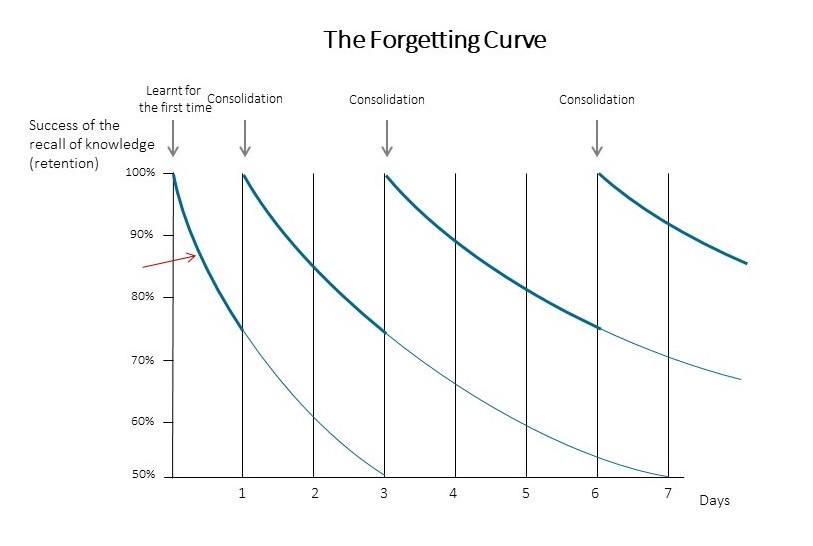⏳ Estimated reading time: 21 min
You are the one who is responsible for your studies and successes. It is important to try several ways of studying to identify those that suit you best and, in this way, shape your own personal studying style. Explore what your most effective studying strategies are. It may suit you to study in the morning or perhaps in the evening. It may be convenient for you to prepare your notes in a certain way. Below we have gathered some important tips to help you organize your studying in the most efficient way.
"I use several strategies when learning: underlining essential information, summarizing content, and Pauk's strategy. Pauk's strategy has 4 steps. The first reading, followed by the second reading and writing of important information in the left column. I shrink what is written on the left side more and more so that there are as few phrases as possible that remind me of the content, and I write them in the right column. Things that cause me problems or that I forget when I repeat them also remain written down. So I write down only the keywords from the left column in the right column. Then I repeat using keywords."
Second year student of the UM Faculty of Arts

Take time to sleep and rest. Avoid cramming late into the night, especially on the last day before the exam.
1. Avoid cramming and learn how to study effectively consistently. For example, study for three days, one hour each day, instead of studying for three hours in just one day. It is scientifically proven that breaks while studying, the kind of studying which includes consolidating acquired knowledge, lead to the formation of lasting knowledge. Cramming may bear the initial fruits, but the acquired knowledge will fade away very quickly as illustrated by the so-called forgetting curve. Another good practice example is to review and edit your notes from class every evening, which serves as a revision of the content and leads to the discovery of any ambiguities in time to resolve them with the support of your teacher.

Without consolidating knowledge, we over time very quickly forget. A red arrow indicates the part of the curve that illustrates the importance of homework and revision of notes on the same day. The more times we consolidate, the more successful the recall of knowledge will be.
(Adapted from: E-Learning Infographics, 2014).
"I often combine several learning strategies. I always try to listen to the lectures as carefully as possible and take notes on the fly, which I usually read twice after each lecture. I then collect the prescribed material, read it, then highlight and extract the most important information. I explain obscure words, terms or concepts and try to connect them with what I already know. With all this, I make a kind of story by trying to present what I have read to myself. I also often use questions and answers from the material I am learning. By creating these stories, I break up the material and when I take the exam, I also recall the information more easily."
Second year student of the UM Faculty of Arts
2. Have you ever read study material and felt that the content was clear and understandable? As a result, you skipped it, and later it turned out that you didn't master this part of the material as well as you initially thought. The feeling of “familiarity" with the content can be very misleading. Even seemingly simple or familiar parts of the study content must be actively approached, consolidated, and deepened. The latter can also additionally motivate you since the feeling that you have already mastered parts of the study content is very encouraging.
3. Make a study plan. Gather information on all study obligations you need to pass. Make a study plan at the beginning of a semester and schedule your studying time accordingly. Remember to include extracurricular activities.
"In lectures, I take notes in paragraphs, as I find it more transparent than condensed text. Before studying, I print out my notes and divide all the material into even chapters so that I cover roughly the same amount of material each day. First, I highlight all the important concepts and words, and then I start reading the notes and consolidating on the fly. At the end of each chapter, I go through the notes again and try to refresh the material. I condense information that I cannot easily remember into individual units (e.g. with abbreviations, I try to remember the number of paragraphs so that I don't forget which ones when enumerating, etc.)."
Second year student of the UM Faculty of Arts
4. Sleep well before studying. Sleep is a physical and mental resting state essential for survival. Sleep deprivation leads to increased fatigue which makes learning very difficult. Students whose schedules include more hours of sleep per night have higher grades than their peers who sleep fewer hours (Wolfson and Carskadon, 2003). In addition, sleep is a key process in learning during which knowledge is consolidated and organized in our brains (Diekelmann and Born, 2010). As a result, you should avoid studying at the expanse of sleep and adjust your day to get enough quality sleep. You can read more about the importance of sleep in connection to learning and development on the WHO website.
5. Set your learning goals for a selected day or week for each study obligation and gradually work towards them ("to do list"). Start with more complex content. Break down extensive tasks and content into smaller and manageable parts.
Reward yourself for your success. Although the acquired knowledge is the most important achievement, give yourself a treat for completed study obligations and hard work. Your focus should not shift from learning to reward. Rewarding yourself is particularly appropriate when studying content that you are less motivated to study.
6. Plan short and long breaks while studying, and then do something that relaxes you. During a long break you can go for a walk to get some fresh air, listen to music, or just relax. Study for short periods of time, for example for 45 minutes, and then take a 5–10 minute break. During a short break, try to avoid television and the like since it may distract you for a long period of time.
7. Don't forget to eat healthy and drink plenty of water. Avoid processed foods and foods with high content of sugar. Avoid hearty meals before studying as they increase fatigue.
8. Get all the necessary literature in a timely manner and make sure all your notes are complete. This helps you to avoid unnecessary stress and waste of time you could use for studying. It is especially important when borrowing books from libraries at a time when several students will be looking for the same literature.
"I usually start studying by arranging my notes with different colors. It helps me to have everything written down in one place. This is how I usually revise the literature recommended for the exam. I write down information that I did not have in the lecture notes. Then I read the notes as many times as possible and consolidate the material, usually out loud. This strategy really suits me, because it is much easier for me to absorb knowledge if I write down the information by hand, I also like to arrange my notes with different colors to attract me when I study. I start studying much earlier so that the whole process can be successful."
Second year student of the UM Faculty of Arts
9. Turn off social media and other distractions while studying. Most phones already allow you to easily turn on the "do not disturb" mode, which will ensure that no one will disturb you. Resent surveys (e.g. Kolhar, Kazi and Alameen, 2021) show a worrying trend as young people spend more than 3 hours a day on social networks, and they themselves find that this excessive use is affecting their academic achievements. Many apps and mobile phones enables you to monitor the amount of time you spend on them. Check the data and maybe you will find yourself surprised.
10. Focus on one activity. Research (e.g. Herszage and Censor, 2017) suggests that carrying out multiple simultaneous activities is significantly less effective. Additionally, multitasking can have a negative effect on brain function, and it is therefore advisable to avoid it. Research (e.g. Janssen et al., 2015) mentions a drop in IQ when you are simultaneously performing activities that require cognitive abilities.
11. Find your own space for studying. Maybe this is a specific place in the library? Your room? Explore where learning works best for you. The room should be bright and quiet enough.
12. Does studying in groups suit you? Although group studying may not be for everyone, give it a try. You can benefit from exchanging notes and learning about different views on study content. Since other group members may know things, you don't, you can gain additional information faster and thus expand your knowledge. You may strengthen interpersonal relationships and communication skills. A study group can also represent a support system in which members encourage each other to work on an ongoing basis.
13. The use of ICT (information communication technology) can support different stages of learning (e.g., organization). Find out more at: Tips for studying with ICT.
